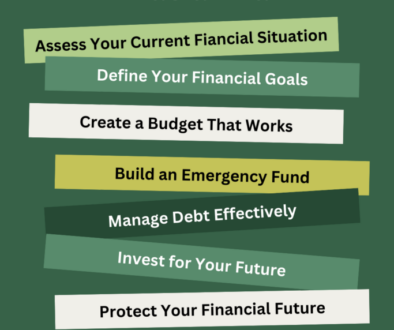Earning Income – Your Gateway to Financial Independence
Money impacts nearly every aspect of our lives—where we live, what opportunities we have, and how secure our future will be. Yet, many people go through life without a clear understanding of how to earn, manage, and grow their income effectively.
This is why financial literacy is essential. It provides the knowledge and skills needed to make smart money decisions and build a stable financial future. According to the National Standards for Financial Literacy, one of the most important financial skills is understanding how to earn income—the foundation of personal finance.
In this blog, we’ll explore the different types of income, how to maximize your earning potential, and how income ties into long-term wealth-building. Whether you’re a student, an early-career professional, or someone looking to improve your finances, this guide will provide actionable strategies to help you take control of your earnings and financial future.
Why Earning Income is the First Step to Financial Freedom Many people dream of financial independence—the ability to cover living expenses without relying on a paycheck. But before you can save, invest, or build wealth, you must first earn money.
Income is the fuel that powers your financial journey. It determines your ability to:
✅ Cover basic needs (housing, food, healthcare)
✅ Save for future goals (buying a home, retirement)
✅ Invest to grow wealth over time
✅ Enjoy financial security and freedom
Without a stable income, even the best budgeting and investing strategies won’t be effective. That’s why understanding how to earn money and increase your earning potential is the first step toward financial success.
Understanding the Different Types of Income
Not all income is created equal. There are several ways to earn money, each with its own characteristics and potential.
Let’s break them down:
- Earned Income (Active Income – Wages & Salaries)
- What it is: Earned income is the money you receive from working a job—whether hourly wages, a salary, or commission-based work. This is the most common type of income for most people.
- Examples:
- Salaried jobs (teachers, engineers, nurses)
- Hourly work (retail workers, baristas, assistants)
- Commission-based roles (real estate agents, salespeople)
- Pros:
- ✔ Reliable paycheck (generally)
- ✔ Potential for benefits (health insurance, retirement plans)
- ✔ Predictable income for budgeting
- Cons:
- ❌ Requires trading time for money
- ❌ Limited earning potential unless promoted or given raises
- ❌ No income if you stop working (e.g., due to illness or job loss)
- Business Income (Entrepreneurship & Self-Employment)
- What it is: Money earned by running a business or freelancing. Instead of working for an employer, business owners create and sell products or services.
- Examples:
- Running an online store (e.g., Etsy, Shopify)
- Offering freelance services (graphic design, web development, consulting)
- Owning a local business (restaurant, gym, auto repair shop)
- Pros:
- ✔ Unlimited earning potential
- ✔ Flexibility and independence
- ✔ Ability to scale and build long-term wealth
- Cons:
- ❌ Income is not guaranteed and can fluctuate significantly
- ❌ Business expenses and risks
- ❌ Requires significant time, effort, and often initial investment to succeed
- Investment Income (Passive Income from Assets)
- What it is: This is money earned from investing in assets like stocks, bonds, real estate, and other financial instruments. These investments can generate income without direct work.
- Examples:
- Dividends from stocks (partial ownership in a company)
- Interest from bonds (loans you make to companies or governments)
- Rental income from real estate investments
- Pros:
- ✔ Money can grow over time through compounding
- ✔ Potential for long-term income streams
- ✔ Reduces dependence on a paycheck
- Cons:
- ❌ Requires initial capital to invest
- ❌ Investments can lose value (market risk)
- ❌ Takes time to see significant returns
- ❌ Requires research and understanding of different asset classes (or professional guidance)
- Capital Gains (Profit from Selling Assets)
- What it is: The profit you make when you buy an asset (like stocks, real estate, or cryptocurrency) and sell it for a higher price.
- Examples:
- Selling stocks for a profit
- Flipping houses for a higher price
- Selling collectibles (rare coins, art)
- Pros:
- ✔ Potential for large profits
- ✔ Can be a way to build long-term wealth
- ✔ Can supplement regular income
- Cons:
- ❌ Capital gains taxes can reduce profits
- ❌ Prices can fluctuate unpredictably (market volatility)
- ❌ Requires market knowledge and careful timing to invest wisely
- Rental & Royalty Income (Ongoing Passive Income Streams)
- What it is: This income comes from leasing out property or earning royalties from intellectual property.
- Examples:
- Renting out apartments or vacation homes
- Licensing music, books, or patents
- Monetizing digital assets (e-books, stock photos)
- Pros:
- ✔ Potential for long-term passive income
- ✔ Can be a relatively reliable income source
- ✔ Can build wealth over time
- Cons:
- ❌ Upfront costs (real estate purchases, content creation)
- ❌ Market fluctuations (rental demand, royalty rates)
- ❌ Maintenance and legal responsibilities (for landlords, etc.)
How to Increase Your Earning Potential
Earning money is only the beginning. To achieve financial independence, you must continuously increase your earning power. Here are some key strategies:
- Invest in Education & Skill Development: The more valuable your skills, the higher your earning potential. Careers in fields like technology, healthcare, and finance often pay more due to high demand.
- Ways to improve skills:
- Take online courses (Udemy, Coursera, LinkedIn Learning)
- Get industry certifications (Google, AWS, project management)
- Learn in-demand skills (coding, data analysis, digital marketing)
- Ways to improve skills:
- Negotiate Your Salary: Many employees never negotiate their pay, potentially leaving money on the table. Research salary benchmarks on sites like Glassdoor and Payscale. Highlight your achievements and skills, and be prepared to counter-offer.
- Explore Side Hustles: A side hustle can supplement your main income and provide valuable experience. Consider freelancing (writing, graphic design), online tutoring, or selling products online. Research different side hustle options to find one that aligns with your skills and interests.
- Start Investing Early (and Wisely): Even small investments can grow significantly over time due to the power of compound interest. However, investing involves risk. It’s crucial to learn about different investment options and consider your risk tolerance. Consult with a financial advisor if needed. Consider starting with low-cost index funds or ETFs.
- Build Multiple Income Streams: Relying on a single income source can be risky. Diversifying your earnings through investments, side businesses, and other ventures can provide greater financial security.
Earning Money is Just the Beginning Understanding how to earn income is the first step toward financial freedom. But to truly achieve wealth, you also need to:
- Save Wisely: Create an emergency fund and live below your means. Track your expenses and create a budget.
- Invest for Growth: Put your money to work through smart, diversified investments.
- Manage Risks: Protect yourself from financial setbacks with insurance (health, disability, etc.) and avoid high-interest debt.
- Plan for the Future: Set financial goals for retirement and other long-term objectives.
By focusing on earning, saving, investing, and managing your finances effectively, you can build a strong foundation for long-term financial success. Consider consulting with a financial advisor for personalized guidance.
💡 What’s Your Next Step?
Which area of your finances are you going to focus on first? Are you looking to boost your salary, start a side hustle, improve your budgeting, or begin investing? Share your thoughts in the comments! 🚀





